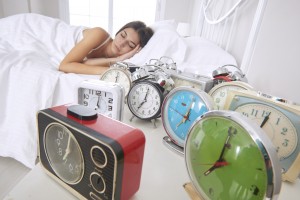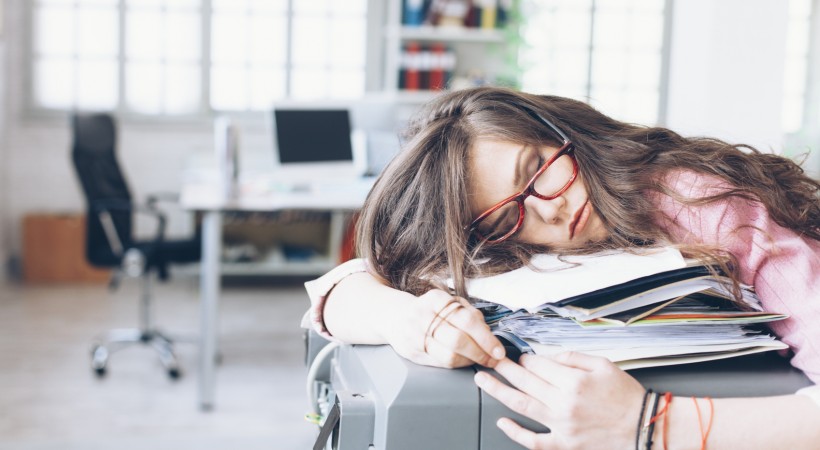We all have friends who hit the gym at 6am, pull 10 hours at the office, pick up their teens from hockey, go for dinner and drinks, stay up till 2am, and be at the gym by sunrise to do it all over again. Sleep deprivation doesn’t even exist in their vocabulary. How do they do it?!
The answer is: It doesn’t matter.
Give Up Keeping Up
What actually matters is that if sleep deprivation is not your jam, you shouldn’t ever feel bad about not keeping up with others! Our culture has perpetuated this stubborn myth that sleep deprivation is normal, and people who function on just a few hours of sleep must be super successful.
Arianna Huffington, co-founder and editor in chief of The Huffington Post recently addressed the modern sleep deprivation crisis in her book, The Sleep Revolution. After fainting from exhaustion at work one day (consequently smashing her head on her desk and busting her cheekbone), she discovered the key to a more productive, meaningful and joyful life was – you guessed it – more sleep. (If you don’t have time to read Arianna’s book, watch her 4 minute TEDTalk and read the rest of this post.)
What is Sleep Deprivation?
Seems pretty obvious, but what exactly does sleep deprivation mean? Do you know how much sleep you should be getting each night? Or how it’s affecting your health?
Sleep deprivation is the condition of not having enough sleep. It can be chronic (a syndrome developing over time) or acute (severe and sudden onset).
Besides fatigue, poor memory and a shorter attention span, sleep deprivation can also result in weight loss/gain, increase the risk of clumsiness, accidents and injuries, cause behaviour and learning difficulties, hypertension, diabetes and depression.
Regular sleep on the other hand, significantly improves our quality of life through optimized emotional, psychological and physical health.
How Much Sleep Should We Be Getting?
An average adult needs between 7.5 – 8 hours of sleep per night.
Sudhansu Chokroverty, an MD and professor at the New Jersey Neuroscience Institute says: “Many people can function with 6 hours’ sleep, and there are some who need 9 hours or more. The amount of sleep needed to function the next day varies from individual to individual, and is determined genetically and hereditarily.” (WebMD Sleep Disorders Health Centre)
Now, your friends might give you a hard time for checking out of a party at 11pm because you’re tired. But you know your body best, and if you know you’ll be a write-off the next day because you’ve not had enough sleep, that’s none of their business. You take care of YOU. And here are some tips to catch even more z’s at night…
TIPS FOR BETTER SLEEP
Create a Sleep Conducive Environment
Your bedroom should be a haven used only for sleep (and the other thing). That’s it. Don’t eat in bed, work from bed, or do anything else that might distract you from getting a proper rest. Black out blinds and sleep masks can be helpful for creating a dark, sleep-friendly environment. Ear plugs too, if you share your bed with a snorer.
A huge no-no is using electronics such as your mobile, tablet or TV before bed. They stimulate your brain and the light stops it from producing melatonin (the sleep-promoting hormone). Don’t use electronics for at least an hour before bed. Actually, I dare you to remove electronics from your bedroom altogether to avoid temptation and blinking lights.
Lower Stress
Lower stress any way you can. Try floating, yoga, meditation, reading, or taking a bath. Avoid arguments before bed or watching anything distressing on TV. Say no to commitments or additional roles (e.g. if you’re volunteering or on a board) if you feel overwhelmingly busy and struggle to get the sleep you need. Read more on taking control of your time.
Eat Well and Exercise
We all know it! But it’s easy to fall off the wagon – I get it. Pack healthy snacks and make lunches ahead of time, so you don’t get caught off guard and buy sugary snacks on the go. And if you’re hungry before bedtime, here’s a list of sleep friendly snacks containing vitamins, minerals and amino acids that help the body and brain get ready for sleep.
Schedule in your exercise. Get your heart rate up for at least 30 minutes each day. But try not to do rigorous exercise just before bed. If it’s late, try something calming like yoga or a walk instead.
Avoid Caffeine and Alcohol
Avoid coffee, tea or other caffeinated drinks at least four hours before bedtime. Same goes for alcohol, especially if it’s mixed with sugary pop.
Routine
Get your body’s internal clock used to the same wake up the same time every day (weekends too). If you can try to get to bed at a reasonable time during the week, you won’t feel like you need to catch up as much over the weekend. If you need a nap, limit it to 30-60 minutes max.

Let me know how you go with the above tips, or add more in the comments. If your sleep deprivation is severe, anxiety or depression may be an underlying reason, in which case you should check in with your family doctor.



